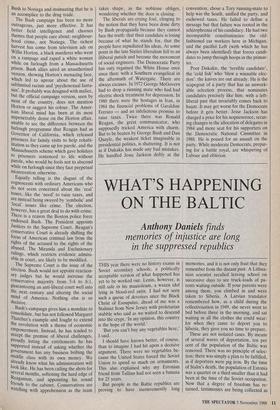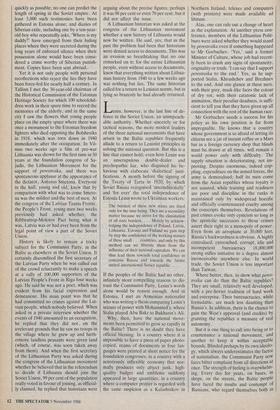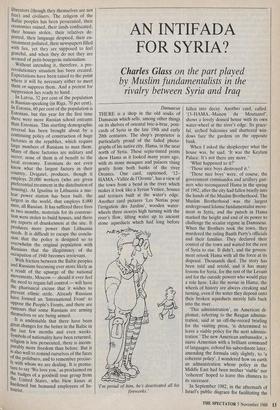WHAT'S HAPPENING ON THE BALTIC
Anthony Daniels finds
memories of injustice are long in the suppressed republics
THIS year there were no history exams in Soviet secondary' schools; a politically acceptable version of what happened has yet to be worked out. Lenin, however, is still safe in his Inausbleum, a waxen idol lying in blood-red satin. .I had not seen such a queue of devotees since the Black Christ of Esoupulas; ahead of me was a Stalinist from New Jersey with proletarian stubble who said as we waited to descend into the crypt, 'In my opinion, this country is the hope of the world.'
'But you can't buy any vegetables here,' I said.
I should have known better, of course, than to imagine I had hit upon a decisive argument. There were no vegetables be- cause the United States forced the Soviet Union to spend so much on armaments. This also explained why my Estonian friend from Tallinn had not seen a banana for 25 years. But people in the Baltic republics are proving to have inconveniently long memories, and it is not only fruit that they remember from the distant past. A Lithua- nian scientist recalled leaving school on successive days to see truck-loads of pa- rents waiting outside. If your parents were among them, you climbed in and were taken to Siberia. A Latvian translator remembered how, as a child during the collectivisation in 1949, she never went to bed before three in the morning, and sat waiting in all the clothes she could wear: for when they came to deport you to Siberia, they gave you no time to prepare.
These are not isolated cases. By means of several waves of deportation, ten per cent of the population of the Baltic was removed. There was no principle of selec- tion; there was simply a plan to be fulfilled, as if deportees were pig iron. By the time of Stalin's death, the population of Estonia was a quarter or a third smaller than it had been at the time of the Soviet occupation. Now that a degree of freedom has re- turned, testimonies are being collected as
quickly as possible; no one can predict the length of spring in the Soviet empire. At least 3,000 such testimonies have been gathered in Estonia alone; and diaries of Siberian exile, including one by a ten-year- old boy who repeatedly asks, 'Where is my daddy?' have emerged from their hiding places where they were secreted during the long years of enforced silence when their possession alone would have been consi- dered a crime worthy of Siberian punish- ment. Copies have been sent abroad.
Yet it is not only people with personal recollections who reject the lies they have been force-fed for nearly half a century. In Tallinn I met the 30-year-old chairman of the Historical Commission of the Estonian Heritage Society for which 100 schoolchil- dren work in their spare time to record the memories of the elderly, and in the same city I saw the flowers that young people place on the empty space where there was once a monument to the Estonian freedom fighters who died opposing the Bolsheviks in 1918, which was torn down in 1940 immediately after the occupation. In Vil- nius two weeks ago a film of pre-war Lithuania was shown for the first time in 50 years at the foundation congress of Sa- judis, the Lithuanian Movement for the support of perestroika, and there was spontaneous applause at the appearance of the dictator, Antanas Smetona. Everyone in the hall, young and old, knew that by comparison with what was to come Smeto- na was the mildest and the best of men. At the congress of the Latvian Tautas Fronte, the People's Front, young men two weeks previously had asked whether, the Ribbentrop-Molotov Pict being what it was, Latvia was or had ever been from the legal point of view a part of the Soviet Union.
History is likely to remain a tricky subject for the Communist Party, in the Baltic as elsewhere in the Soviet Union. It certainly discomfited the first secretary of the Latvian Party when he was called out of the crowd reluctantly to make a speech at a rally of 100,000 supporters of the Latvian People's Front in Riga four weeks ago. He said he was not a poet, which was evident from his facial expression and demeanour. I lis main point was that he had committed no crimes against the Lat- vian people, which nobody believed. When asked in a private interview whether the events of 1940 amounted to an occupation, he replied that they did not, on the irrelevant grounds that he saw no troops in the village where he grew up and furth- ermore landless peasants were given land (which, of course, was soon taken away from them). And when the first secretary of the Lithuanian Party was asked during the congress of the Lithuanian movement whether he believed that in the referendum to decide if Lithuania should join the Soviet Union, 99 per cent of the population really voted in favour of joining, as official- ly claimed, he replied that historians were arguing about the precise figures; perhaps it was 98 per cent or even 70 per cent, but it did not affect the issue.
A Lithuanian historian was asked at the congress of the Lithuanian movement whether a new history of Lithuania would now be written. He said, yes; that in the past the problem had been that historians were denied access to documents. This was an evasion so breathtaking that no one remarked on it; for the entire Lithuanian people, even without access to documents, knew that everything written about Lithua- nian history from 1940 to a few weeks ago was nothing but lies. The same historian called for a return to Leninist norms, but in lying so brazenly he had already returned.
Lenin, however, is the last line of de- fence in the Soviet Union, an unimpeach- able authority. Whether sincerely or for tactical reasons, the more modest leaders of the three national movements that have arisen in the Baltic republics frequently allude to a return to Leninist principles in solving the national question. But this is a line that cannot hold; even here Lenin was an unscrupulous double-dealer and psychopathic liar, who disguised his be- haviour with elaborate 'dialectical' j usti- fications. A month before the signing of the Treaty of Tartu in 1920, by which Soviet Russia recognised 'unconditionally' and 'for ever' the total independence of Estonia Lenin wrote to Ukrainian workers:
The borders of these new states are fixed only for the time being. They are a secondary matter because we strive for the elimination of all state borders. . . . Merely by acknow- ledging the independence of Poland, Latvia, Lithuania, Estonia and Finland we gain step by step the confidence of the working masses of these small . . . countries, and only by this method can we liberate them from the influence of their national capitalists. We can 'thus lead them towards total confidence as concerns Russia and towards the future united international Soviet republic . . . .
If the peoples of the Baltic had no other, infinitely more compelling reasons to dis- trust the Communist Party, Lenin's words alone would be reason enough. And in Estonia, I met an Armenian nationalist Who was writing a thesis comparing Lenin's seizure of power with Mohammed's, where Stalin played Abu Bakr to Bukharin's Ali.
Why, then, have the national move- ments been permitted to grow so rapidly in the Baltic? There is no doubt they have official blessing. In a country where it is impossible to have a piece of paper photo- copied, reams of documents in four lan- guages were printed at short notice for the foundation congresses; in a country with a notoriously inflexible economy that nor- mally produces only abject junk, high- quality badges and emblems suddenly appeared in large quantities; in a country where a computer printer is regarded with the same suspicion as a Kalashnikov in
Northern Ireland, telexes and computers (with printers) were made available ad libitum.
Alas, one can rule out a change of heart as the explanation. At another press con- ference, members of the Lithuanian Polit- buro were asked whether they would stand by perestroika even if something happened to Mr Gorbachev. 'Yes,' said a former Minister of Culture, whose job had recent- ly been to crush any signs of spontaneity, originality or truth. 'I can say that I support perestroika to the end.' Yes, as he sup- ported Stalin, Khrushchev and Brezhnev to the end. And one glance at these men, with their grey, mask-like faces the colour of dry rot, with their catatonic lack of animation, their peculiar deadness, is suffi- cient to tell you that they have given up all connection with the rest of the human race.
Mr Gorbachev needs a success for his policy as his own position is far from impregnable. He knows that a country whose government is so afraid of letting its citizens see a jar of instant coffee or a Mars bar in a foreign currency shop that blinds must be, drawn at all times, will remain a world power only with difficulty. The supply situation is deteriorating, not im- proving. Despite enormous, indeed crip- pling, expenditure on the armed forces, the army is demoralised; half its men come from the Asian republics whose loyalty is not assured, while training and readiness are poor and discipline in the ranks is maintained only by widespread horrific and officially countenanced cruelty among the conscripts themselves. Revelations of past crimes evoke only cynicism so long as the apostolic successors to those crimes assert their right to a monopoly of power. Even from an aeroplane at 30,000 feet, Russia's backwardness is obvious. A highly centralised, entrenched, corrupt, idle and incompetent bureaucracy 18,000,000 strong stifles initiative to a degree almost inconceivable anywhere else. In world trade, the Soviet Union is less important than Taiwan.
Where better, then, to show what peres- troika can do than the Baltic republics? They are small, relatively well developed, with a pre-Soviet tradition of hard work and enterprise. Their bureaucracies, while formidable, are much less daunting than Russia's. In addition, there is the chance to gain the West's approval (and credits) by granting the republics a measure of real autonomy.
But it is one thing to call into being or to countenance a national movement, and another to keep it within acceptable bounds. Blinded perhaps by its own ideolo- gy, which always underestimates the factor of nationalism, the Communist Party now faces bitter complaint from all directions at once. The strength of feeling is overwhelm- ing. Every day for years, on buses, in shops, on the streets, the Baltic people have faced the insults and • contempt of Russians, who regard themselves both as
liberators (though they themselves are not free) and civilisers. The religion of the Baltic peoples has been persecuted, their economies ruined, their lands confiscated, their houses stolen, their relatives de- ported, their language despised, their en- vironment polluted, their newspapers filled with lies, yet they are supposed to feel grateful, and when they do not they are accused of petit-bourgeois nationalism. Without intending it, therefore, a pre- revolutionary situation has been created. Expectations have been raised to the point where it will be necessary either to meet them or suppress them. And a pretext for suppression lies ready to hand. In Latvia, 52 per cent of the population is Russian-speaking (in Riga, 70 per cent). In Estonia, 60 per cent of the population is Estonian, but this year for the first time there were more Russian school entrants than Estonian. This startling demographic reversal has been brought about by a continuing policy of construction of huge factories in the republics, which require large numbers of Russians to man them. Many of these factories are military and secret; none of them is of benefit to the local economy. Estonians do not even know what the largest factory in their country, Dvigatel, produces, though it employs 20,000 workers (who are given preferential treatment in the distribution of housing). At Ignalina in Lithuania a nuc- lear power station has been built, the largest in the world, that employs 8,000 men, all Russian. It has suffered three fires in two months, materials for its construc- tion were stolen to build houses, and there are reports of drunkenness at the site. It produces more power than Lithuania needs. It is difficult to escape the conclu- sion that the policy is designed so to overwhelm the original population with Russians that the illegitimacy of the occupation of 1940 becomes irrelevant.
With friction between the Baltic peoples and Russians becoming ever more likely as a result of the upsurge of the national movements, Moscow — should it ever feel the need to regain full control — will have the pharisaical excuse that it wishes to prevent ethnic strife. Already Russians have formed an 'International Front' to oppose the People's Fronts, and there are rumours that some Russians are arming themselves or are being armed. It is undeniable that there have been great changes for the better in the Baltic in the last few months and even weeks. Symbols of nationality have been returned, religion is less persecuted, there is incom- parably more freedom than before. But it is also well to remind ourselves of the faces of the politburo, and to remember precise- IY with whom we are dealing. It is prema- ture to say 'We love you,' as proclaimed on the badges of a goodwill tour group from the United States, who blew kisses at hardened but bemused employees of In-




































































 Previous page
Previous page